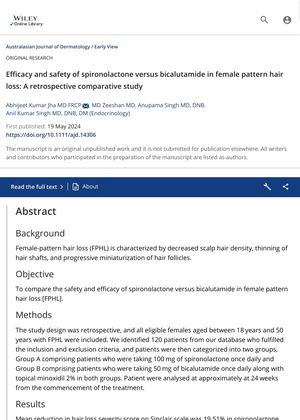Dermoscopic features can help distinguish female androgenetic alopecia from telogen effluvium and healthy controls.
 15 citations
,
July 2020 in “Dermatologic Therapy”
15 citations
,
July 2020 in “Dermatologic Therapy” FPHL is common in women, influenced by genetics and hormones, and can be treated with medications, laser therapy, or hair transplantation.
 16 citations
,
March 2020 in “Journal of The American Academy of Dermatology”
16 citations
,
March 2020 in “Journal of The American Academy of Dermatology” Oral bicalutamide is safe and effective for female hair loss.
 8 citations
,
October 2019 in “Dermatologic Therapy”
8 citations
,
October 2019 in “Dermatologic Therapy” Bicalutamide improves hair density in women safely.
 80 citations
,
December 2017 in “International Journal of Dermatology”
80 citations
,
December 2017 in “International Journal of Dermatology” Low-dose oral minoxidil and spironolactone combo effectively reduces hair loss and improves hair density in women.
 40 citations
,
September 2017 in “F1000Research”
40 citations
,
September 2017 in “F1000Research” Oral minoxidil effectively reduces hair shedding in women with CTE, with no major side effects.
 15 citations
,
January 2017 in “JAMA Dermatology”
15 citations
,
January 2017 in “JAMA Dermatology” Topical minoxidil improves female pattern hair loss, finasteride not effective, laser devices show mixed results.
 32 citations
,
April 2015 in “British Journal of Dermatology”
32 citations
,
April 2015 in “British Journal of Dermatology” The hair shedding scale accurately identifies abnormal hair shedding in women with long hair, with grades 5 and 6 indicating excessive shedding.
 30 citations
,
March 2011 in “Australasian Journal of Dermatology”
30 citations
,
March 2011 in “Australasian Journal of Dermatology” Flutamide improves female hair loss when other treatments fail, but may cause liver toxicity.
 14 citations
,
August 2010 in “The Open Dermatology Journal”
14 citations
,
August 2010 in “The Open Dermatology Journal” Australian women with female pattern hair loss have a poorer quality of life, and starting treatment doesn't immediately improve it.
 53 citations
,
May 2010 in “PubMed”
53 citations
,
May 2010 in “PubMed” Spironolactone helps regrow hair in women with hair loss.
 137 citations
,
July 2004 in “Journal of The American Academy of Dermatology”
137 citations
,
July 2004 in “Journal of The American Academy of Dermatology” Horizontally sectioned scalp biopsies are more reliable for diagnosing hair loss in women when three samples are taken instead of one.
 90 citations
,
January 1999 in “Journal of The American Academy of Dermatology”
90 citations
,
January 1999 in “Journal of The American Academy of Dermatology” "Christmas tree" pattern helps diagnose female hair loss.
 581 citations
,
October 1998 in “Journal of The American Academy of Dermatology”
581 citations
,
October 1998 in “Journal of The American Academy of Dermatology” Finasteride safely and effectively treats male pattern hair loss, but may cause reversible sexual issues and harm male fetuses.

















